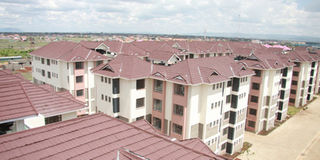City’s middle class to bear the brunt of housing crisis

New apartment targeting Kenya's growing middle class. The debate on the benefit of the new economic status to the common man is misplaced because all what the economists told us is that our economy is bigger than previously thought. PHOTO | FILE
What you need to know:
- While the middle upper to upper housing markets have a glut, according to experts, the swelling middle class is already finding it difficult to locate suitable housing, either for purchase or to rent.
- The report is part of a plan to increase investor rating on Kenyan real estate.
Nairobi’s middle class will find it harder to secure affordable housing in the coming years if the slow growth of construction caused by rising interest rates and prices of material is not reversed.
According to the first-ever annual report on the state of development in Nairobi launched last week by The Kenya Property Developers Association and HassConsult, the under-development of housing that fits middle class status and pockets will become more acute in a few years as this population grows.
While the middle upper to upper housing markets have a glut, according to experts, the swelling middle class is already finding it difficult to locate suitable housing, either for purchase or to rent.
“The housing shortage in Nairobi is acute; it is deteriorating. The country projects to build 200,000 housing units every year to match population growth. But in 2013, just 15,000 housing units were planned in Nairobi,” according to the report.
It goes on to say that sharp increases in land rates and county government construction fees have increased financial disincentives to housing development. For example, fees for construction permits were raised between 200 times and 1,250 times since the city became a county. Many counties, including Nairobi, have increased property rates to increase revenue, which could exacerbate the housing problem.
“Nairobi has declared its intention to emerge as a world class city, but this depends on housing construction where current trends are instead slowing down,” said chief executive officer of Kenya Property Developers Association, Ms Robyn Emerson.
The report is part of a plan to increase investor rating on Kenyan real estate. The Jones Lang LeSalle Global Real Estate Transparency Index, used by investors globally to assess the safety and appeal of regional real estate investments, rates Kenya at 67 of 97 countries for the quality of information on its real estate industry.





